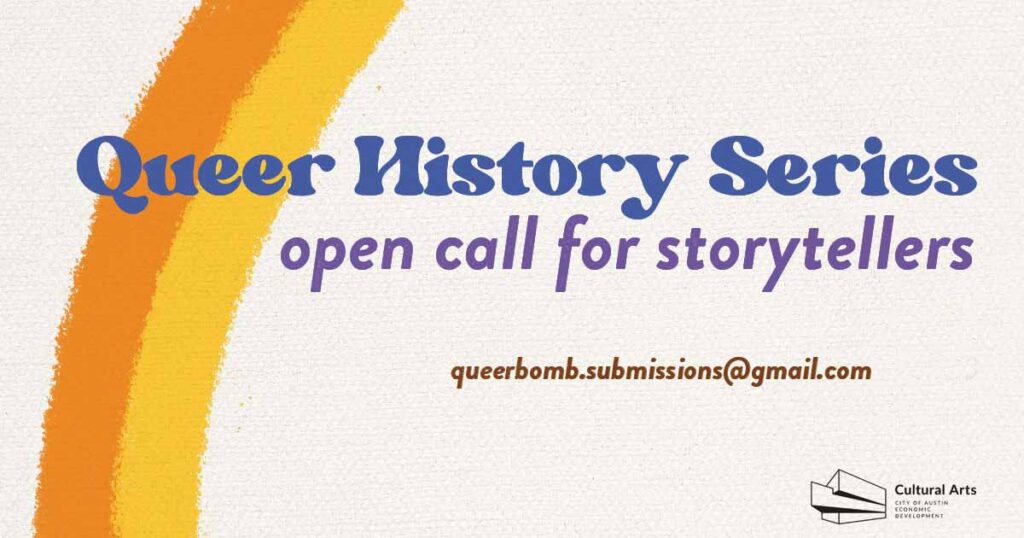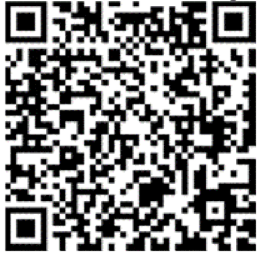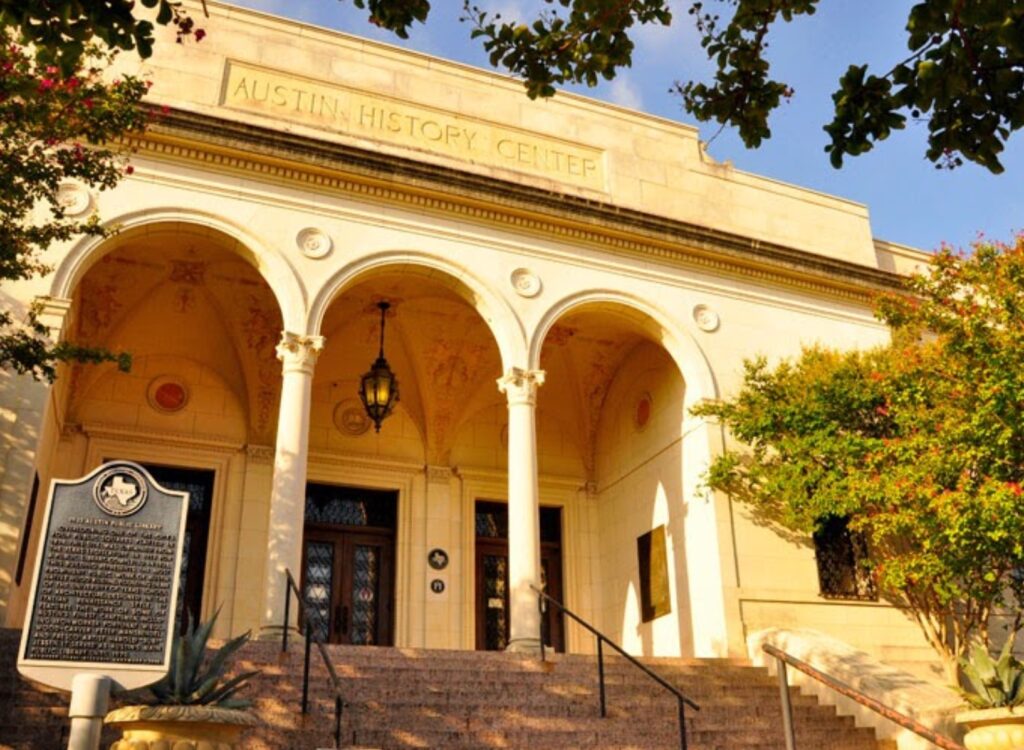
Main Entrance
(Navigate this page with the pulldown menu above for LGBT History)
The aim of The Memory Project is to expand the Austin History Center’s collection and archives by seeking donations of additional historical materials. In particular, The Project will preserve personal stories and recollections of community events by recording (audio and video) interviews with people from across a wide spectrum of the LGBTQ+ population of our city down through the years. We especially hope for participation of racial, gender, class, etc. minorities. We know that minorities get forgotten. That’s what we’re working to prevent.
The Austin History Center has a Facebook page with lots of interesting postings about local history.
https://www.facebook.com/AustinHistoryCenter/
The History Center has a good LGBTQ collection. And they are interested in expanding it. If you are looking for a place to leave historical records and archives, please consider the History Center. (Below are instructions for how to submit material for the History Center.)
AND take a look at the quiz below. How much do you know about Austin’s LGBTQ+ history? Maybe our little quiz will pique your interest and, maybe, remind you of things you know about that you’d like to see remembered by the community at large.
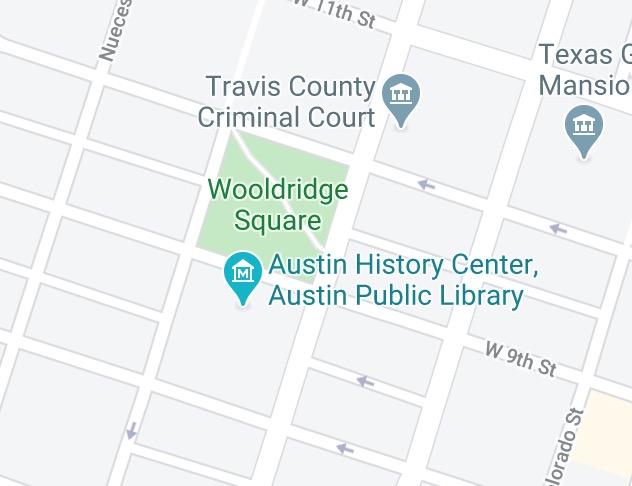
There is parking across the street in the City Building
The History Center has an existing LGBTQ collection, consisting of papers and documents, many are related to specific individuals—like Doug Dyer, one of the founders of Esther’s Follies and producer of the 1989-90 gay/lesbian activists’ musical comedy review I Pass for Straight.
Also in the collection, for example, are the papers of Janna Zumbrun, the most visible lesbian activist in Austin for a decade, chair of the Fair Housing Ordinance Alliance and Director of AIDS Services of Austin. Also, the papers of Powell (“Punky”) Shepherd, dancer, choreographer, playwright, director, and artist, and his friend Joe Ed Manry, theater director. Activists, artists, poets, dancers, photographers, musicians, businesspeople, professionals, politicians, movers and shakers—WE are all of these. And all of us have played a role in making Austin what it is. Let’s preserve this rich legacy.
We are acting as agents for collecting these documents and records. The Memory Project will not edit, interpret, spin or sell any of these materials. The Project encourages researchers and scholars to use the material, of course, and it will be available to the general public as well.
We want everybody to participate. Our initial effort will be to widen our nets and expand our contact lists to include as many aspects of Austin LGBTQ+ life as we can. We’re also looking for interviewers and, of course, for interviewees. We need your help to reach out. We invite you to participate virtually by emailing us about your interest and helping us to set up a network through the internet.
Please tell us your stories. The future is going to want to know what the past was like. And we are the only ones who can tell them.
Long time Austinite Dennis Paddie was part of the rise of Gay Liberatwion in Austin the 1970s. He spoke about that time at a meeting of Austin Prime Timers, July 14, 2024. Here’s a YouTube video of his presentation. https://youtu.be/1pro_nsKs_Y
Here’s a little quiz.
What do you remember? (click on the number after the ? to see the answer)
- Where was the first meeting of Austin Gay Liberation Front held? 1 Sutton Hall on the U.T. Campus, March 1970
- Where was the National Gay Liberation Front Conference in 1971 convened? 2 The University Y on Guadalupe (now a Pizza joint) & The Unitarian Church on Grover
- Who chaired the ad hoc committee for the Austin Fair Housing Ordinance? Housing Subcommittee of the Human Rights Commission and was active in crafting the recommendations to City Council concerning the Fair Housing Ordinance in 1977? 3 Janna Zumbrun. Her papers are at the Austin History Center
- Where was the first Gay Pride at Fiesta Gardens founded? 4 The Austin History Center front meeting room in 1989
- Who founded AIDS Services of Austin? 5 Paul Clover, director of Waterloo Counseling, out of which ASA developed
- Who founded the Octopus Club? 6Lew Aldridge & Jim Lommori & Denise Lavendar
- Who staged famous Halloween parties in old Gay Austin and where? 7Don Rhodes on Helms St in the late 60s
- Who ran for U.T. Student Body President in the 50s and was exposed as a homosexual, but came within 30 votes of winning? 8 Charles Hayden, who later took the name Randy Wicker, and became a leader in The Mattachine Society
- Who was the first black lesbian U.T. Student Body President? 9 Toni Luckett in 1990
- Who were founders of ALLGO? 10 Michael Alfaro, Saul Gonzalez and Dennis Medina
- Which dairy industry lobbyist also represented the gay Tavern Guild? 11 Betty Naylor
- Who founded Liberty Books, the lesbian and gay community bookstore on N Lamar and 11th ? 12 Tom Doyal in 1986
- Who founded BookWoman and where was the original store? 13 Susan Post on East 6th Street in 1980
Donate Items
The vast majority of the collections at the Austin History Center have been donated by many generous individuals and organizations throughout our community. We greatly appreciate such generosity and continue to rely heavily on this support in order to continue building collections for future generations.
If you are interested in making a donation, we require that you fill out and sign a Deed of Gift form. This document formally establishes the transfer of ownership of materials to the AHC. Please fill out as much information as you can including copyright information located on the back of this form. Having the completed form ready when you bring your donation in helps facilitates the donation process. For info, click on this link to the Austin Public Library site
https://library.austintexas.gov/ahc/donate-items
Here are some general guidelines for the types of items we collect and for those we do not, either because they fall outside of our collection development policy or due to staffing and space limitations. If you have items that are not included in the list below, please contact us at 512-974-7480 before throwing anything out. We welcome the opportunity to discuss and review your material. If the items in question are not suitable for our collection, we can assist you in finding a more appropriate place for them.
Download the Deed of Gift Form from this website
Download the Austin History Center Oral History Release form
Download Library of Congress Sample Release Forms
Items of interest
Personal Papers:
- Family letters
- Diaries or journals
- Scrapbook materials, such as programs, invitations, other documentary mementos, obituaries, newspaper clippings
- Recorded or written oral history interviews or memoirs
- Legal records, such as wills, estate materials, deeds, court records, contracts
- Photographs and photo albums
- Motion picture film
Organizational Records:
- Charters, membership lists, minutes, yearbooks, programs, press releases
- Correspondence
- Newsletters, brochures
Business Records:
- Correspondence
- Financial records, such as ledgers, record books, inventories, annual reports
- Legal records, such as contracts, deeds, court records
- Ephemera, such as flyers, calendars, schedules, posters, menus
- Photographs or photo albums
Printed Materials:
- Newspaper clippings
- Books
- Pamphlets
- Posters
- Broadsides
- Maps
Audiovisual materials:
- Music on disc, cassette tape, vinyl
- Oral history interviews
- Video
Artistic materials:
- Posters
- Drawings
- Photographs
Items not suitable for donation:
- Information not specific to Austin/Travis County
- Blank forms
- Duplicates or multiple copies
- Family Bibles
- Artifacts - clothing, textiles, statues, models, jewelry and other three-dimensional objects
- Certain financial records, such as canceled checks and receipts
- Old newspapers
- Computer manuals
- Materials in poor condition, including defaced text or items that show evidence of mold, mildew, pests, significant embrittlement, or disrepair.
- Mailers, flyers, invitations, announcements and other advertisements that lack any substantive information about an organization, event or individual(s). In other words, we do not accept items that only list names, times, dates, locations or prices.
Please note that although the AHC reserves the right to decline items that are in very poor or fragile condition, we are more than happy to accept such materials if they have been transferred onto an appropriate archival medium such as acid-free paper or digitized and saved to CD or DVD.
We also ask that you provide appropriate contextual information for the items you are donating in either a list form or printed legibly somewhere on each item including pertinent names (individuals, places, events) dates and titles. Providing contextual information not only saves staff valuable time but also insures that your donation has maximum research value to our customers.
Everybody’s Interested in History
Click on the caption or the image to go to the Facebook page.
Austin’s Queerbomb is looking for Queer elders to share stories for their Queer History Series. If you or someone you know are interested in sharing stories for our documentary and panel, reach out to [email protected].
You can still share a story if you’re camera shy by submitting your story as a 2 minute voice recording, along with transcript and photos of you that suit your story. We’re so excited to hear from you!
Here’s an example of a similar project that originated in Alabama.
The Invisible Histories Project
Designed to be a repository for the preservation of the history of LGBTQ life first in the state of Alabama and then the entire Southeast.
Here’s a possible funding source for history projects
| Funding starts at $25,000. |
 |
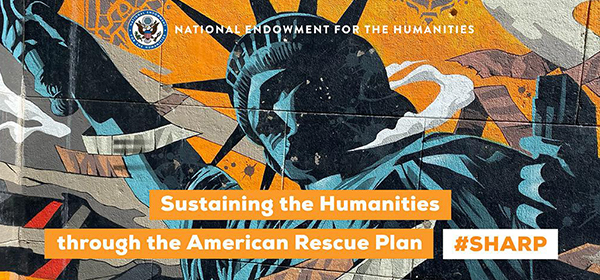 New Grant Opportunity for Diverse Places: Telling the Full History Preservation Fund The National Trust for Historic Preservation, a public-interest organization dedicated to saving America’s historic places, is launching Telling the Full History Preservation Fund, a one-time grant program to help interpret and preserve historic places of importance to underrepresented communities across the country. Made possible through the National Endowment for the Humanities’ American Rescue Plan Humanities Grantmaking for Organizations, the Telling the Full History Preservation Fundgrant applications will be accepted starting November 2021. To sign up for updates on this grant program, please click here to join our grants interest list. The Telling the Full History grant program will provide $25,000 and $50,000 grants for humanities-based work to interpret and preserve historic places of importance to underrepresented communities including, but not limited to, women, immigrants, Asian Americans, Black Americans, Latinx Americans, Native Americans, Native Hawaiians, and LGBTQIA communities.Applications will be accepted from 501(c)(3) nonprofit humanities-based organizations, accredited public and 501(c)(3) colleges and universities, as well as state, local, and Tribal governmental agencies. Funding will be awarded in the following categories: Research, planning, and implementation of interpretation programs Research and documentation for local, state, and federal landmark designations Architectural design and planning to preserve and activate places of diversity Training workshops to support preservation and interpretation of places of diversity Telling the Full History grants aim to support the core activities of humanities-based organizations as the organizations recover from the pandemic and use historic places as catalysts for a more just and equitable society. Along with the grant funding, National Trust staff will provide technical assistance to grantees.To learn more about this and other National Trust funding programs, visitForum.SavingPlaces.org/tellingthefullhistoryfund.GET UPDATES |
| ©2021 National Trust for Historic Preservation 2600 Virginia Avenue NW, Suite 1100, Washington, DC 20037 202.588.6000 | 800.315.6847 | 202.588.6085 (fax) Forum.SavingPlaces.org | Manage Email Preferences |
Invitation to participate in the Austin History Project
Dear Austinite
Several history projects are going on in Austin these days. I’m writing to tell you about a couple of them that I’m involved with through the Public Library’s History Center and the University of Texas. Additionally, there are similar projects to collect local history through Queerbomb, through The Little Gay Shop, and through Oakwood Cemetery Chapel.
I invite you to participate in at least one or two of these.
In collaboration with the Austin History Center, the LGBT Coalition on Aging is hosting “The Memory Project: LGBTQ History in Austin.” There is a webpage at https://algbtcoa.org/the-memory-project/
Arro Smith, Ladi Loera, Dennis Paddie, Dean Carpenter Turner, and I are working with the History Center to expand their LGBT collection. There is a description of the collection on the webpage. Dennis is our main contact with the History Center staff (specifically archivist Kelly Harrell); Arro, Ladi, Dean and I will be conducting interviews through Zoom or in person when possible; and I am doing the inviting, hoping that most of you will remember my name from Liberty Books days and trust email from me enough to open it.
For this project, to make the facts and bits of memory easier to find, listen to, and understand, we are inviting contributors to tell brief (5 or 6 min) stories about some specific event they knew about, witnessed, or were part of in our collective community history that reveal some facet of the past that ought to be remembered and/or that changed the course of history. ☺️ Participants would be welcome to tell several such stories in several different clips. We’ll do these over the computer with Zoom. It should be easy and fun. As we collect these stories, we’ll save them (probably to disk) and add them to the Austin History Center’s collection. Staff at the History Center are enthusiastic about expanding this collection.
Dr Lauren Gutterman is a professor in the University of Texas LGBTQ Studies Dept; she also teaches interviewing skills. Working with Lisa Moore and Karma Chavez, Gutterman is getting her students to interview a wide range of LGBTQ+ Austinites about their lives and experiences. These are likely longer interviews about a variety of topics, including subjects’ personal lifestories. These interviews, also probably conducted by Zoom, will be archived at the University and shared with the Austin History Center (and maybe even the Library of Congress).
Please think about contributing your stories to these projects. We have lived through a remarkable time in human history; especially within the LGBTQ world we have seen unimaginable success and unquenchable sorrow. Let’s get our experience into the collective mind.
On the-memory-project webpage, there are instructions for donating papers and memorabilia to the History Center. Even if you don’t want to record an interview, maybe you’d send in papers or documents that will otherwise be lost at your passing. (See above on this page about Donating Items.)
I’m currently a contact for both these projects. Please reply and let me know what you think.
The webpage page again is https://algbtcoa.org/the-memory-project/
The email address we’re using is [email protected]
Toby Johnson
PS I have a page on my website about Liberty Books with a brief chronology of the store. Also on that page is a list, in somewhat random order, of things in gay/lesbian Austin of the 80s and 90s. Reading that list might jog your memory, and it might remind you of something I left out. If so, please let me know. I would like to keep expanding this list.
https://tobyjohnson.com/libertybooks.html
toby
Toby Johnson
ALGBTCOA Steering Committee member
![]()
More History
The Watson Chateau – Austin’s Well-Kept Secret
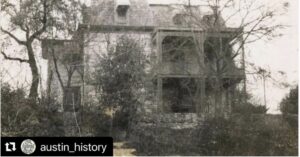
Hiding on University of Texas at Austin campus, next to the School of Nursing, a peculiar building peeks out from behind old trees, tall fencing, thick vines, and overgrown bushes. (The B&W photo is from the 1940s.) Unlike all the other buildings on campus, no sign announces the university-owned Arthur P. Watson House (a.k.a. The Chateau or Watson Chateau). Built in 1853 by Margaret Neville Bowie, it is the oldest building on campus and ranks among the oldest buildings still standing in Austin. The house has architectural historical significance. Its various owners played many vital roles in Austin, Texas, and the American frontier history. It is also a place filled with under-told history about women, African-Americans, and 50 years of importance to the LGBTQ community.
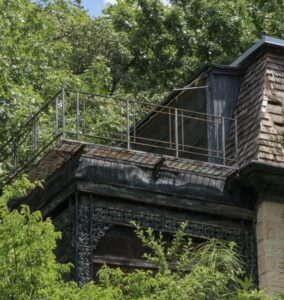
Arthur P. Watson, Jr. was the last private owner of The Chateau. He shared his home, his life and his very successful interior design business with Robert “Bob” Garrett. Their house and gardens became a living portfolio for their work. But their beautiful home was not just a showpiece, it was meant to be enjoyed. Together they hosted countless parties and gatherings for their friends, colleagues, and various groups of society.
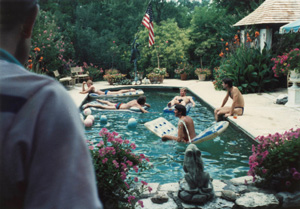
Originally on the outskirts of town, with each passing decade, Austin’s bustling city center expanded closer to the house, eventually engulfing it. Because the Watson Chateau was tucked into a cliff on Waller Creek, it was screened from public scrutiny and provided a much-needed respite for gay men for almost five decades: a place to gather safely, liberated from the restraints of society’s rigid expectations and judgements. There was a downside to being hidden in plain sight. The same aspects that protected The Chateau and its residents in the past now allows it to fade away. Physically deteriorating without people noticing, it also continues to slip from local collective memory.
If you visited The Chateau, have photos/videos, or simply heard stories, please contact Marta Stefaniuk at [email protected] to help her continue collecting its vital history. Use the same email address to receive updates on steps the Watson Chateau Committee is taking to try to save the house. Or follow the Watson Chateau on Instagram or Facebook for news.
For more details and photos of the Watson Chateau visit the digital exhibit “To Liberate” published by the Oakwood Cemetery Chapel (museum) or visit watsonchateau.com

The Austin Chronicle has a page with a map of gay bars in Austin going back to the 1950s originally compiled by Elizabeth Green in 2019

Guy Town Historical Marker
Originating with Council Person Zo Qadri, the City of Austin has passed a resolution to erect an historical marker in the 4th & Colorado St area commemorating LGBTQIA+ contribution to the city. A committee of The Memory Project: LGBTQ History in Austin—a project of the Coalition on Aging—has been asked to offer sample text. A commissioner on the Architectural Review Commission has taken on this project and is working with us. Here is the sample text which the COA Committee submitted:
As queer as you want to be.
This historical marker commemorates the contributions, struggles, and successes of Austin’s LGBTQIA+ community, whose once -denigrated members have always spanned all genders, races, classes, creeds, generations, and origins.
In earlier times, people lost their jobs, social standing, and sometimes even their lives for being sex- or gender-variant. Outside of the isolation of private homes, downtown bars and nightclubs offered secret, safe havens for LGBTQIA+ people to gather.
Social justice movements in the 1960s advancing the struggles for justice, acceptance, equality, and freedom for women and racial minorities gave rise to a national gay and lesbian rights movement. Austin was quick to respond. A local chapter of the Gay Liberation Front was founded in 1970, with the first National Gay Liberation Conference hosted here in 1971.
A vibrant culture evolved with restaurants, bars, retail shops, bookstores, theaters, churches and a wide variety of professionals and service providers. In the 1980s, a nightlife scene developed in the old warehouse district around 4th Street and Colorado. Clubs with drag shows, entertainment, and dances provided opportunities for gathering and community building. During the AIDS crisis of the 80s and 90s, the clubs offered occasions for sex education, counseling, and fundraising—and solace. In the 21st century, as the movement evolved to recognize all Lesbian, Gay, Bisexual, Transsexual, Queer, Intersex, Asexual, and other segments of the community, these blocks of bars and coffee shops became integrated with the rest of downtown—much like the assimilation of queer representation into mainstream culture.
With many of the political and social dreams of the leaders of past decades realized, Austin remains a vibrant place for all communities to call home.
![]()
National Historic Sites Survey
Our first step is conducting a survey to learn about who is doing what in the field. The survey launches this week – to coincide with LGBTQ+ History Month – and will be open through the mid-December. We invite you to take the survey and tell us more about your efforts associated with LGBTQ+ historic sites, spaces, and places.
Our second step will be convening four national conversations virtually to learn more about what people are doing and to make connections among those doing the work. These will take place in early 2024 and there will be a place in the survey for you to identify if you are interested in participating in these conversations.
You can learn more about the survey, its purpose and design here: https://drive.google.com/file/d/1-B6KHx30gYOU0oWuYh8QRpZ9q9qhZkNr/view?usp=sharing
You can take the survey here: https://www.surveymonkey.com/r/VQ52SQ2. We strongly encourage people to take the survey by mid- November. Although it will be open longer, this will help us determine if additional outreach is needed.
You can also access the survey here:
Please help us out by taking the survey or spreading the word via your networks.
Thank you for your consideration,
National Committee to Explore LGBTQ+ Site-Based History
Steven Louis Brawley, St. Louis LGBT History Project, Jeffrey A. “Free” Harris, Rainbow Heritage Network, Sylvea Hollis, Inaugural NPS Mellon Postdoc in Gender & Sexuality, Madison Levesque, Architectural Historian, Ken Lustbader, NYC LGBT HIstoric Sites Project, Diego Robayo, Historic Districts Council, New York City, Megan Springate, Department of Anthropology, University of Maryland, Shayne Watson, Watson Heritage Consulting
